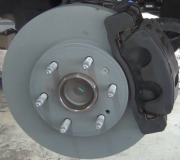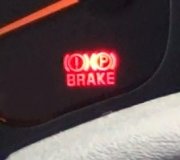When this only happens to one front brake, the best suspect is a constricted rubber flex hose, but to have that happen on both sides at the same time isn't very likely. To identify that, the only way to make that brake release right away is to crawl underneath and open the bleeder screw on that caliper. That will let the trapped pressurized brake fluid escape.
When this affects both front wheels at the same time, it is usually due to the brake fluid was contaminated with a petroleum product. That can include engine oil, transmission fluid, power steering fluid, axle grease, and penetrating oil. Those fluids are not compatible with the rubber used for parts that contact brake fluid. They'll cause the rubber parts to swell, and most commonly it's the rubber lip seals in the master cylinder that grow past the fluid return ports to the reservoir and block them. The trapped brake fluid keeps the brakes applied slightly, and the constant friction generates heat. That heat migrates into the brake fluid where it expands, and since it can't release back into the reservoir, it applies the brakes even harder, and that generates more heat. This keeps on building as long as you force the car to keep moving.
The way to identify the brake fluid is being trapped by the master cylinder is to loosen the steel lines where they attach to it. If that lets the brakes release, the repair is an expensive one. The only proper solution is to remove every part that contains rubber that contacts the brake fluid, flush and dry the steel lines, then install all new parts. That includes the master cylinder, calipers (again), wheel cylinders, rubber flex hoses, and the combination valve that sits on the frame right under the master cylinder. If the replacement master cylinder doesn't come with a new reservoir and / or caps, the rubber bladder seals under the caps must be replaced too. If the car has anti-lock brakes, which yours does since traction control is an added-on option to the ABS system, the hydraulic controller must also be replaced because it has rubber seals and o-rings inside it. If any rubber part is not replaced, the contamination will leach out of it and recontaminate the new brake fluid and new parts.
This problem can also be caused on many car models by the brake light switch being out of adjustment. If it holds the brake pedal down a little, that will also keep the brake fluid trapped, and it will build pressure the same way. To identify this as the cause, loosen the nuts holding the master cylinder the power brake booster, then pull it forward 1/8th inch or more. If that lets the brakes release, it is not the seals in the master cylinder that are trapping the brake fluid. It is simply that the brake pedal is not being allowed to return fully.
Wednesday, January 15th, 2020 AT 12:30 PM



